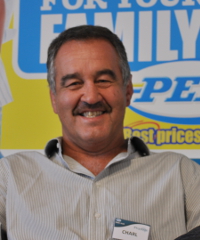Meet the Boss: Charl Cronje, managing director, Pepkor Africa
‘Meet the Boss’ is a How we made it in Africa interview series where we pose 10 questions to business leaders across the continent.

“I guess what really keeps me awake is whether we are moving fast enough to catch this ‘African wave’ in its full capacity,” says Charl Cronje, MD of Pepkor Africa.
Charl Cronje, managing director, Pepkor Africa
1. What was your first job?
I was a training officer at Pep Stores, 30 years ago. I studied at Stellenbosch University and I did my honours in industrial psychology. I always wanted to become an HR manager and then I got a junior job at Pep and thought I would give it a go for three or four months and if it doesn’t turn out well, I will move on. But I got fantastic experience. My core responsibility was to develop programmes to train store managers, and to do that I had to run a store myself. So I had to become a store manager in order to understand the procedures and processes and need for structural training.
2. Who has had the biggest impact on your career and why?
I would say Pieter Erasmus, the current group CEO of Pepkor, for his ability to give a well-defined mandate and to empower you to execute your strategy within your mandate, as well as allocating resources whenever needed.
He has also had a lot of confidence in Africa because he has worked in Africa himself. So when everyone else was questioning [whether expansion on the continent was feasible] he was pushing for it… and my mandate is to be the growth vehicle in Africa – for aggressive, sustainable growth.
3. What parts of your job keeps you awake at night?
Excitement over expanding across the continent. But I guess what really keeps me awake is whether we are moving fast enough to catch this ‘African wave’ in its full capacity. Things are happening fast, but sometimes you can only move as fast as your people can run.
4. The top reasons for your success in business?
First of all I have a passion for what I do. I believe in the power of teamwork, and take accountability whether things go right or wrong. When things go wrong, always start with yourself and ask what you can do better. I don’t like this whole thing about blaming. If things go wrong, I ask what I can do to fix it.
5. What’s the best thing about your country, South Africa?
We have one of the most fantastic countries in diversity and in opportunity.
6. And the worst?
I think South Africa is over-regulated which makes it difficult for foreign companies, and for entrepreneurial thinkers within our country, to really create opportunities needed to contribute to the economy and to reduce the unemployment rate.
7. Your future career plans?
To make Pepkor’s business model in Africa the most successful the continent has ever seen.
8. How do you relax?
I relax with a fantastic glass of wine. I’m crazy about good wine – red or white. I also enjoy mountain biking and of course just spending time with family and friends.
9. Your message to Africa’s young aspiring business people and entrepreneurs?
Spot the opportunity, develop a good business model, and have the courage to go and execute it, despite setbacks.
10. How can Africa realise its full potential?
Firstly, with good leadership. Leaders should identify the opportunities and synergies in certain areas to operate as a continent, and not as 54 independent countries. From a political point of view I would say the continent has become quite stable, if you look at the latest elections.
From an economic perspective we have fantastic resources, but we have to make it investor safe and friendly for good returns. And for that, you need stability in policies and in governance.
Charl Cronje is managing director of Pepkor Africa, currently looking after the group’s portfolio in six countries – Mozambique, Malawi, Zambia, Zimbabwe, Angola and Nigeria. He joined Pep Stores around 30 years ago, after graduating from Stellenbosch University with an honours degree in industrial psychology.

